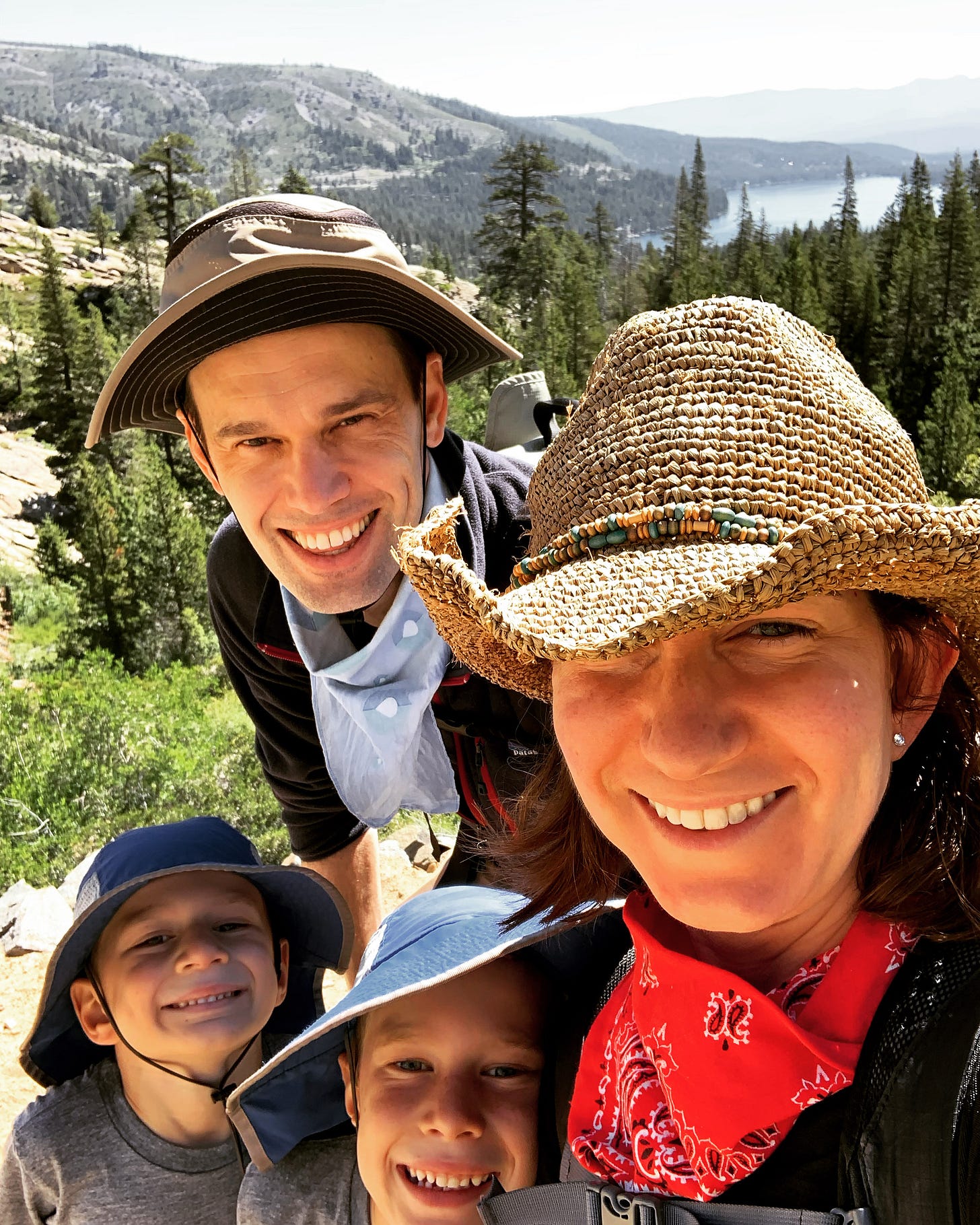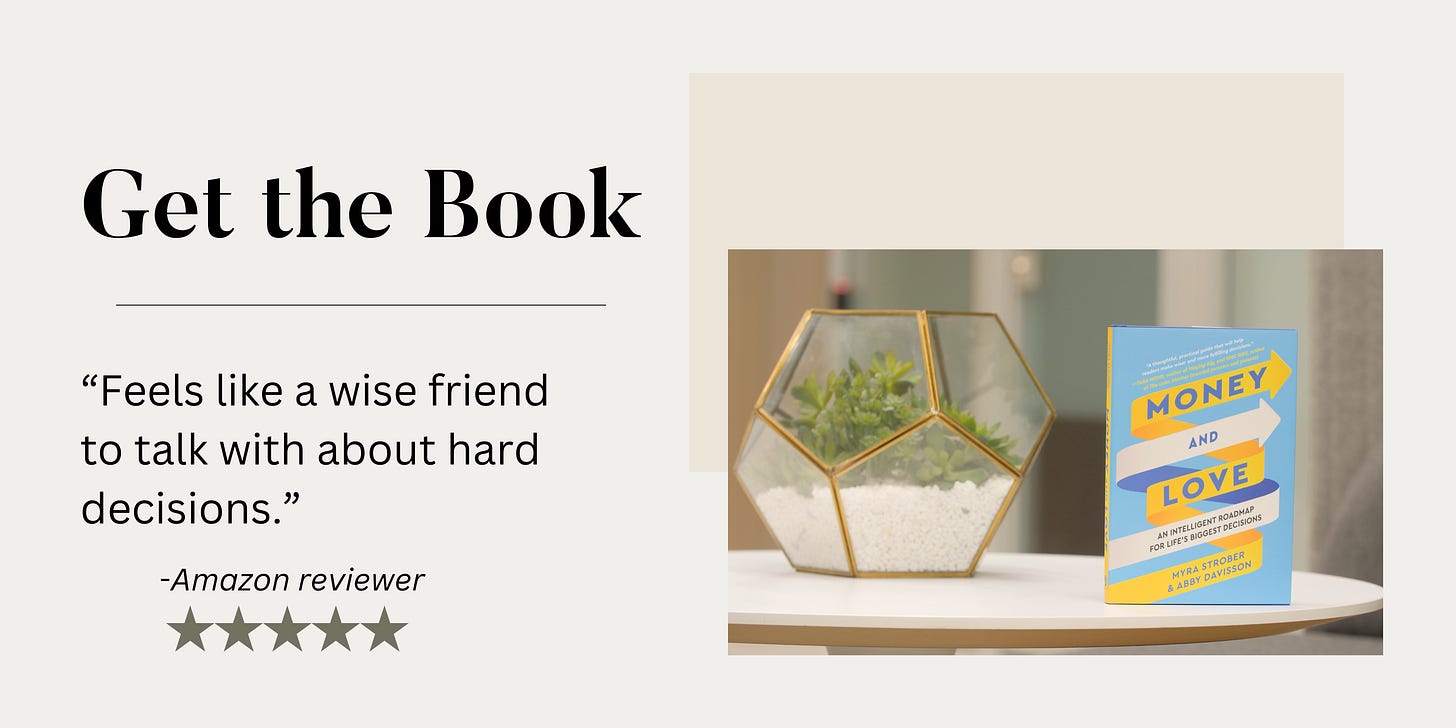I'm traveling at the moment, which may explain why this post from my friend
caught my eye. Abby is the author of "Money and Love: An Intelligent Roadmap for Life's Biggest Decisions" as well as the “Practically Deliberate” Substack newsletter, in which she writes about her “efforts to be intentional about everything (within reason).”As she explains:
I do my best to distill actionable insights about intentionality, decision-making, and personal development to help people pursue what matters most to them. Why? So we can all feel happier, healthier, and more fulfilled.
I love Abby’s newsletter—it’s one of the ones I look forward to the most—and so I thought I’d share a recent post with you.
In this post, she gives evidence-backed advice for how to make sure that you’re spending your money in ways that actually increase your happiness—which is useful advice in general, and especially when you’re traveling.
I’ve already taken Abby’s advice multiple times myself, whether it’s about traveling, Substack, or specific products (she recently did a great post about some of her favorite travel gear, and thanks to her, I have acquired some lovely Nikki McClure prints for my home office). She is, indeed, “practically deliberate.” She’s also a great writer and friend—and introducing her to you is my daily delight.
To scrolling less, living more, and enjoying your time away,
—Catherine Price
PS: Speaking of making wise decisions, I recommend subscribing to Abby’s newsletter:
And now, here’s Abby!
My family is taking an international trip this summer, and I’ve been knee-deep in planning mode (I have wayyyyy too many browser tabs open right now).
This trip has been a long time coming. We first got our kids their passports in the Fall of 2019 (when they were six and four) in anticipation of taking an international trip the following year. We all know how that turned out!
Earlier this year, we renewed those passports and — fingers crossed — booked tickets to Spain.
This is not only the first international trip we’re taking as a family, it’s the longest since Ross and I both repotted our careers.
It’s one thing to plan a big trip when your paycheck is direct deposited into your bank account regularly; it’s another when you’re working for yourself and your income is less predictable.
But you don’t need to have made a career pivot to be feeling less than flush these days. With prices up significantly in recent years due to inflation, a dollar simply doesn’t go as far as it used to.
Which is why I was intrigued to come across Happy Money: The Science of Happier Spending by Elizabeth Dunn (a psychology professor) and Michael Norton (a business/behavioral economics professor). The book outlines five research-backed principles to ensure you’re getting the biggest happiness bang for your buck, which is exactly what all we want to do, especially now.
I found these principles enlightening, so I’m sharing them along with how I’m using them to rationalize guide our vacation spending.
Tip #1: Buy experiences, not things
In the recent course I taught on Big Life Decisions, the concept of home ownership as an aspirational life milestone came up. Despite the fact that home ownership is out of reach of many, it’s still held out as an important marker of adulthood (at least in the United States).1
But the data suggest that this highly anticipated purchase doesn’t necessarily make us happier.
So what does?
Experiences.
Dunn and Norton cite study after study finding that spending on experiences leads to more happiness than spending on material goods — even homes. For example:
“One ongoing study has tracked how much money adults over age 50 spend on just about everything, from refrigerators and rent to alcohol and art. When researchers link these spending choices to happiness, only one category of spending matters. And it’s not refrigerators, or even alcohol. It’s what the researchers label “leisure”: trips, movies, sporting events, gym memberships, and the like. People who spend more of their money on leisure report significantly greater satisfaction with their lives. Not surprisingly, the amount of money these older adults reported spending on leisure was dwarfed by the amount they spent on housing. But housing again turned out to have zero bearing on their life satisfaction.”2
The specific study they cite (linked in footnotes) attributes this happiness boost partially to the fact that leisure activities often increase our levels of social connectedness.
My personal experience confirms the study’s findings. Last year, we spent a considerable sum to install new front windows and paint the exterior of our house, which has had little bearing on my own life satisfaction.
However, my weekly tennis class has given me a huge happiness boost (for a fraction of the cost).
This finding validated our decision to spend money on this trip now, even though our first instinct may be to invest in some other aspect of home maintenance that feels more “responsible.”
Tip #2: Make it a Treat
It’s been a few weeks since my younger son’s birthday. The gifts he received from friends at his party, once captivating, now remain mostly untouched (until, of course, his older brother shows even mild interest in them).
We acclimate quickly to what we have or do regularly. Many studies underscore how once we have greater access to something — whether that something is chocolate or an expensive car — the novelty quickly wears off. Dunn and Norton assert, “abundance, as it turns out, is the enemy of appreciation.”3
The guidance here is to limit our access to indulgences because the “little treats of daily life may provide a purer source of pleasure than people realize.”4 By adding a dose of novelty, we end up appreciating those treats more.
At home, we alternate between “fruit nights” and “dessert nights.” On vacation, that rule goes out the window and every night is dessert night. However, upon reading this research, I’m thinking that maybe we shouldn’t eat gelato every day (though this may make me very unpopular with my family).
Give yourself a treat by subscribing to Practically Deliberate!
Tip #3: Buy time
I’ve long been a proponent of buying time through outsourcing. Dunn and Norton don’t discuss outsourcing (unless you count an anecdote about a family that loves roombas), but they do remind us that “purchases that reduce or eliminate the worst minutes of our day can provide a big happiness bang for our buck.”5
They discuss three activities in detail: commuting, watching television, and socializing, citing studies that conclude:
Long commutes make people unhappy (but taking the train is better than driving)
Watching more than 30 minutes of TV/day is correlated with lower life satisfaction
Spending time with friends and family is a significant contributor to happiness
I read this chapter as we were strategizing about how we’d travel to different destinations within Spain. Reading about how driving makes people disgruntled reminded me of the epic argument Ross and I once had after a particularly stressful drive in Provence (pre-kids).
I promptly booked us high speed train tickets, feeling confident that my train-loving kids would see this as a treat and we’d get the benefits of buying ourselves time.
What are some specific ways you’ve spent money to buy yourself time? I’d love to hear if you’re willing to share!
Tip #4: Invest in others
Given the volume of research on how social relationships contribute to our well-being, I wasn’t surprised to learn that one of the recommended approaches involves spending money on others.
One study found that people who used $10 Starbucks gift cards to treat a friend to a caffeinated drink were happier than those who gifted the $10 card to someone else (but didn’t spend time with them) or spent it on themselves (even when a friend came with them to Starbucks).6
As Dunn and Norton note, ”You’re likely to get the biggest happiness bang for your prosocial buck if you invest in others in ways that help you connect with people, especially people you care about.” 7
The impetus for going to Spain was to visit some dear friends who have been living in Madrid this past year. As luck would have it, we’ll also get to see some other friends who have spent this past year in Barcelona. So we were already investing in spending time with people we care about.
Now we know we should treat them to un café con leche when we see them!
Tip #5: Pay now, consume later
This tip is counterintuitive, and it’s changed the way I’m approaching travel planning (now and in the future)!
Our culture of instant gratification encourages us to enjoy our purchases now and defer the pain of paying as long as possible. This trend has only accelerated with the proliferation of Afterpay and other buy now, pay later solutions.
But the research indicates consuming now and paying later doesn’t make us happy. In fact, to maximize our happiness, we should be doing the opposite: paying now and consuming later.
Adding in a delay between when you purchase something and when you consume it allows the anticipation to build. When we anticipate a positive future event, we envision the ideal version of that event; indeed, I pictured a vacation in Provence filled with lavender fields and local cheese (instead of a fight over a rental car).
A study of more than one thousand people showed that vacationers were happier in the weeks before a trip than in the weeks afterward.8
By pre-paying for a vacation (or another purchase) ahead of time, you separate the pain of paying from the pleasure of consumption, freeing yourself up to experience the full benefits minus the simultaneous (or subsequent) twinge of remorse.
So how has this changed the way I approach planning? I’m trying to pre-pay for the bigger ticket items as much as possible, booking Airbnbs instead of hotels (better for our family of four anyway) and buying tickets and tours in advance where possible. This is not only aligned with the research, it’s enabling me to picture the vacation more vividly, which is getting me more excited about going.
Of course, I don’t want to tip into over-planning, so I’m trying my best to be, well, practically deliberate about it.
Deliberately yours,
Abby
1 I was fascinated to learn that adult Gen Zers (19-25 year olds) own homes at higher rates than Gen Xers or Millennials did at the same age (source).
2 Elizabeth Dunn and Michael Norton, Happy Money: The Science of Smarter Spending (New York: Simon & Schuster, 2013), p. 61. See the study here.
3 Ibid, p. 27.
4 Ibid, p. 51.
5 Ibid, p. 60.
7 Ibid, p. 119.












Love your newsletter, Catherine, and love Abby's as well! Highly recommend that folks subscribe to both!!
Loved reading this! I’m all about experiences at this stage of my life. Things are easily forgotten. Experiences aren’t.